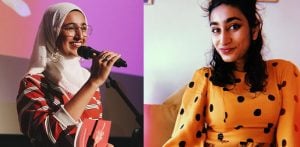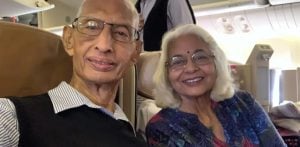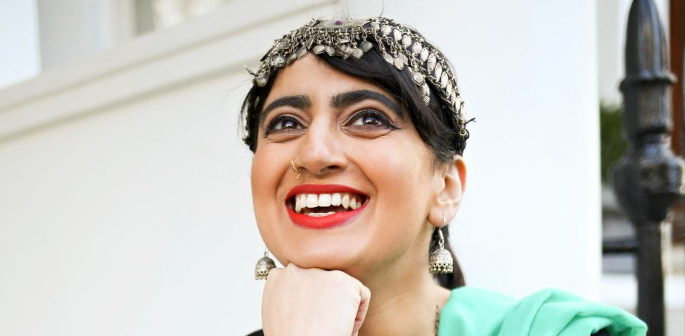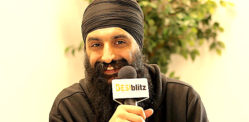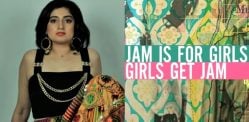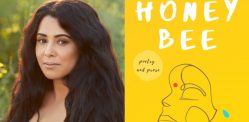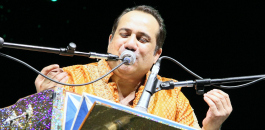"For too long these stories have not been captured by those who have the experience to best articulate it."
British Asian women are speaking out in UK’s spoken word scene with Shagufta K Iqbal helping to lead the charge.
The British Asian poet is carving out a space for British Asian women in traditional creative environments like literature festivals. But she’s also establishing new platforms like The Yoniverse poetry collective’s open mic nights, ‘Golden Tongue’ at Rich Mix London.
2017 additionally saw Burning Eye Books release her debut poetry collection, Jam Is For Girls, Girls Get Jam. Elsewhere, she creates compelling cross-form work with her poetry accompanying short films.
Iqbal wears so many hats including “poet, filmmaker, workshop facilitator and founder of The Yoniverse poetry collective”. We simply can’t miss the opportunity to talk to Shagufta K Iqbal about her exciting range of projects, both current and future.
But we also chat to her on exactly why they’re important for British Asians as well as some of her advice for aspiring poets.
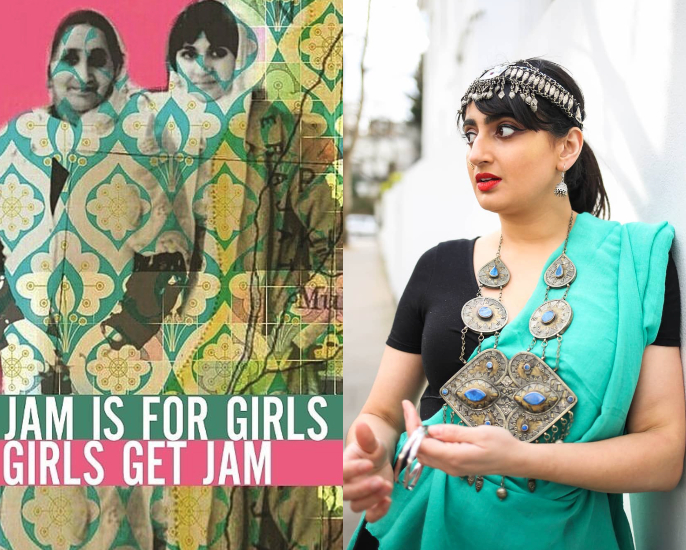
Using Her Success Story For Others
Shagufta K Iqbal is mainly recognised for her poetry. She describes her powerful and successful style as:
“Political, Feminist, Punjabi, reflective of the experience of a Muslim woman in Southern England and what that means within a global framework.”
Nevertheless, as any writer will know, developing this style is a complex endeavour, which often changes and develops over time.
Indeed, Shagufta K Iqbal reveals that when writing her poems:
“There is not one specific process, there are a series of writing prompts and exercises that start a new piece.
“These have been picked up by going to masterclasses and working under the guidance of some amazing poets such as Zena Edwards.”
It often seems that the work of other poets and creating poetry communities can be very helpful. Here, Iqbal shows how the support of guidance of other aids poets in developing in their practice.
Inspiringly, Shagufta K Iqbal hasn’t rested on the laurels of her own success. Instead, she is the founder of The Yoniverse, a poetry collective.
Their mission is to bring female poets to a wider audience including their core talented group. Currently, the collective features the gifts of Afshan D’Souza-Lodhi, Shagufta K Iqbal, Amani Saeed and Shareefa Energy.
By bringing together these British Asian female poets, The Yoniverse celebrates the diversity of British Asian poetry. Importantly, there is no one type of British Asian poetry but a wealth of different experiences and ideas.
However, there’s more to the story behind why Iqbal started The Yoniverse. She tells us:
“As South Asian Muslim poet, you are always worrying about the quality of your work, or whether you are just a tick box exercise for lazy organisations.
“I ran a workshop in a local school and was disappointed to see that so many years after I had left school, young South Asians were still unable to take up space.”
She continues:
“This was very much the trigger for feeling that there was a need to create a support network like The Yoniverse. A place that grows you, pushes you to experiment with your work, it is a platform that allows you to be brave with your voice.”
With its regular open-mic nights already proving popular, it’s clear that Iqbal has created something special.
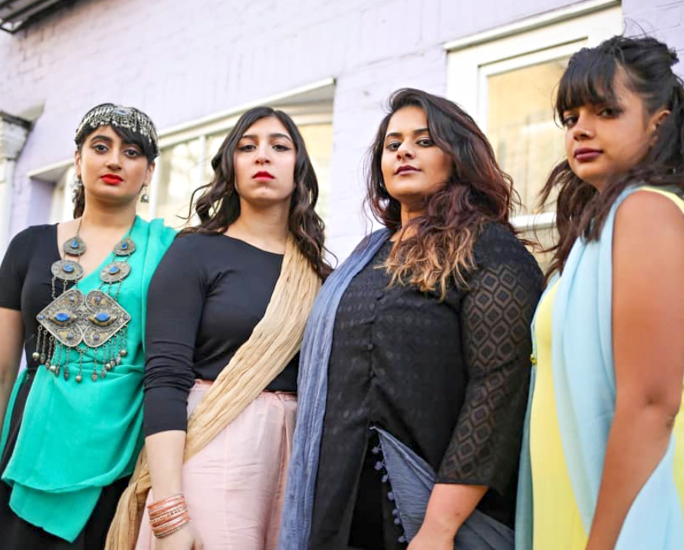
The Importance of Developing The Yoniverse
In spite of The Yoniverse’s quick popularity, Shagufta K Iqbal isn’t satisfied with just this. She has more exciting plans where she wants to take the exciting collective to reach new audiences:
“The Yoniverse really wants to grow beyond a London-centric focus, and take the excitement of Golden Tongue to other cities, and we are currently working on this.”
Iqbal herself hails from Bristol. Her story proves that the best creative talent isn’t always in London.
Although members of The Yoniverse have already appeared at Manchester Literature Festival 2018, this isn’t enough. Iqbal explains why she is so keen to reach audiences outside of London:
“There are so many audience members outside of London, with whom our work resonates with, who want to hear their own stories on the stage, and we want to reflect that in our working ethos.
“Most of us are based, between London, Manchester, Leicester and Bristol, so we know the value of bringing these things to other UK cities.”
But still isn’t the limit of Shagufta K Iqbal’s plans for the collective as she adds:
“We are also working on a poetry collection, which will be released with Burning Eye Books, which we are very excited about!”
This is good news for fans of The Yoniverse especially from more remote cities and town of the UK.
The collective is significantly raising the profile of British Asians. However, for those who may question why this is important, Iqbal has the perfect response:
“Because we exist, and we matter.”
“For too long these stories have not been captured by those who have the experience to best articulate it.”
And we look forward to seeing how The Yoniverse tells these stories.

DIY vs Mainstream
It’s sadly true that we don’t hear stories of British Asians. But there are positives to British Asian spoken word poets making their own spaces according to Iqbal:
“Of course! I love the DIY culture that is being produced as a counter space to established arts organisations, who have for so long overlooked the talent and narratives from WOC.”
On the other hand, some would argue that larger institutions have begun to pay attention to poets. Spoken word poets now increasingly work with brands.
While there are naturally financial benefits, this is a cause for concern for the future of spoken word. Iqbal considers this further:
“This is a difficult conversation to have, because there are so many nuances that we can discuss in relation to working with brands and what that means.
“I think this is quite a dangerous territory, because I think of spoken word as a calling out against the larger oppressive frameworks that govern our society.
“Consumerism and capitalism have such a chain of exploitation, that it is difficult to find brands that do not work in this way. But I also understand that it is difficult for artists to survive in a society that puts such little value on creativity.”
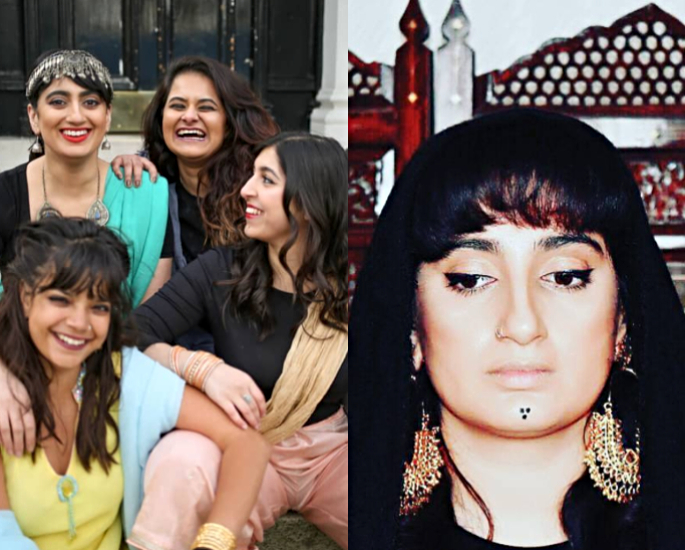
Challenging Yourself Creatively
Hearteningly, Iqbal shows that there are opportunities for spoken word artists to survive and even thrive. In addition to her usual work, Iqbal pushes herself creatively by writing poetry to work alongside short visual narratives.
She expands on what this offers her as an artist:
“The ‘Borders’ poetry film, addresses a real heartbreaking and traumatic historical experience, that I felt it needed a wider conversation than that offered by the spoken word scene.
“So film seemed like the most obvious and powerful way to disseminate this information. I was fortunate to meet a wonderful director, Elizabeth Mizon and she really understood the vision behind this film.”
It seems that Shagufta K Iqbal will never stop pushing herself professionally. Plus, this drive manner can be inspirational for others.
In fact, for those interested in starting to perform poetry, she shares some tidbits of advice:
“READ! Read poets, and visit open mics. But first and foremost, craft your skill, go to workshops and masterclasses, edit your work.”
With projects like The Yoniverse and her own words of wisdom, who knows who she may inspire?
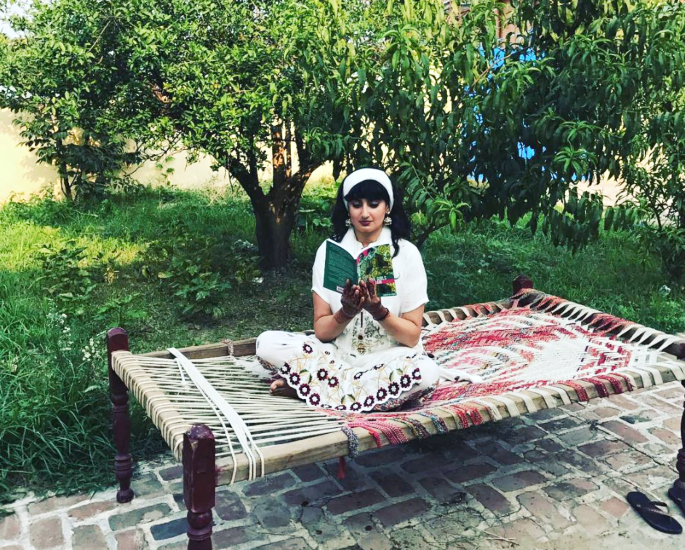
Looking Back and To The Future
Shagufta K Iqbal is evidently very busy. Nevertheless, it’s some of these extra projects that are the highlights of Iqbal’s career so far. She reflects that:
“The Yoniverse poetry collective is something I am immensely proud of, the family of it, I am always in awe of the work of each individual collective member.
“The recognition the ‘Borders’ poetry film has received and having my debut poetry collection come out in 2017 has been a real highlight. I have been working to this goal for such a long time, so to find a home in Burning Eye Books for it, has been a real blessing.”
But she then continues:
“I feel challenges, as much as they can hold an artist back, are Allah’s way of asking us to reflect within ourselves and try and find an alternative way to our goals. You learn something new with every setback.”
Shagufta K Iqbal will be doing a lot with The Yoniverse and these other projects. Nonetheless, she has no plans to slow down in her solo career either, sharing:
“I am currently working on my second poetry collection, an Anthology of UK South Asian female poets, and my debut novel.”
But on the differences between novel writing different to writing poetry, she reveals:
“It has been completely different! It requires a commitment I have not yet practised in my writing. I am still learning the skill of creating longer more sustained pieces of work.
“And I would not have been able to really get this project off the ground, had it not been Arts Council funding and the experienced guidance of my mentor Sarvat Hasin, author of This Wide Night.
But when continuing to imagine her own professional hopes, she lists some of her dream places to perform to include:
“Bradford Literature Festival, Jaipur, Karachi and Lahore Festivals. Someone hook me up!”
It wouldn’t be surprising if this happens sooner rather than later with Shagufta K Iqbal’s talent and determination.
Iqbal highlights that it’s possible to attain success while supporting fellow creatives. Instead, to effectively boost underrepresented voices, there’s a strength in numbers.
It will be interesting to see where she takes The Yoniverse both literally and figuratively. But regardless it’s heartening to see a buzz of creativity in and outside of London.
Similarly, we hope to see Shagufta K Iqbal and her peers’ work encourage new and exciting British Asian voices.
Perhaps one day, this younger generation will mention ‘Golden Tongue’ in the same breath as Bradford Literature Festival, Jaipur, Karachi, Lahore Festivals and more.


